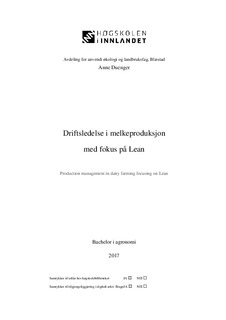Driftsledelse i melkeproduksjon med fokus på Lean
Bachelor thesis
Permanent lenke
http://hdl.handle.net/11250/2447189Utgivelsesdato
2017Metadata
Vis full innførselSamlinger
Sammendrag
Norsk landbruk har helt siden andre verdenskrig vært igjennom en omfattende strukturendring.
Som følge av disse endringene har sysselsetting og antall gårdsbruk blitt kraftig redusert.
Effektivisering har blitt en faktor som preger landbruket, og det har vært nødvendig å sette
større fokus på driftsledelse for å skape gode rutiner og arbeidsvaner. Kvalitetssystemer og
andre verktøy brukes som hjelpemidler for å opprettholde kontroll og styring i virksomheten.
Lean er et forholdsvis nytt system innenfor landbruket, som setter fokus på å gjøre «mindre
av alt». Samarbeid, involvering og tilstedeværelse er faktorer som knyttes tett opp mot bonden,
og Lean har de senere årene satt søkelys på driftsledelse i landbruket.
Målet med dette studiet var å finne mulige forklaringer til at mjølkebønder eventuelt lykkes
med Lean. Finnes det forklaringer på hvorfor noen lykkes, mens andre ikke gjør det? Er det
sånn at noen bønder har bedre forutsetninger for å klare det enn andre?
Det ble gjennomført en kvalitativ og kvantitativ spørreundersøkelse, der ti bønder som hadde
kjøpt rådgivning på Lean fra Tine, deltok. Bøndene ble stilt ulike spørsmål om personalia som
alder, erfaring, utdanning og sivilstatus, samt spørsmål om medarbeidere, rådgivertjenesten,
motivasjon og målsettinger.
Resultatene viste at bøndene som lyktes med Lean i stor grad hadde involvering av familie
eller medarbeidere på ukentlig eller daglig basis, samtidig som de hadde flere ansatte enn de
som lyktes i noe grad. Samtlige bønder som lyktes i stor grad hadde en høyere utdanning fra
høgskole eller universitet.
Rådgivertjenesten hadde bidratt i ulik grad til implementering og utvikling hos den enkelte
gårdbrukeren, og det var ingen sammenheng mellom graden av hjelp fra rådgivertjenesten og
i hvilken grad de lyktes med Lean. De fleste oppga at Lean hadde påvirket måten de jobbet på
og at det hadde gitt dem mer motivasjon.
Studiet belyser flere egenskaper hos mjølkebønder som har lyktes med Lean i noe eller stor
grad. Det er tydelige likhetstrekk hos de som har lyktes med Lean i stor grad, selv om det er
vanskelig å vite om det er konkrete forklaringer, ettersom utvalget ikke bestod av en
kontrollgruppe med bønder som lyktes i liten eller ingen grad. Norwegian agriculture has since second world war underwent an extensive structural change.
As a result of these changes, employment and the number of farms has been greatly reduced.
Efficiency has become a factor that affects agriculture, and it has been necessary to put focus
on operating management to create good routines and work habits. Quality systems and other
tools is used as aids to maintain control and management of the business. Lean is a relatively
new system, which focuses on making "less of everything." Cooperation, involvement and
presence are factors associated with the farmer, and Lean has in recent years drawn attention
to the operation management in agriculture.
The aim of this study was to find possible explanations why dairy farmers possibly succeed
with Lean. Are there any explanations why some succeed while others do not? Is it true that
some have better assumption to make it in agriculture than others?
It was carried out a qualitative and quantitative survey where ten farmers, who had purchased
consulting in Lean from Tine, participated. The farmers were asked various questions about
personal details such as age, experience, education and marital status, as well as questions
about employees, consultant service, motivation and objectives.
The results showed that farmers who succeeded in Lean had a greater involvement of family
members or co-workers on a weekly or daily basis. They also had more employees than those
farmers who succeeded to some extent. All farmers who had a higher success rate had also a
higher education, from either a college or a university.
The counselor service had contributed in varying degrees to the implementation and
development of the selected farmers, and there was no correlation between the counselor
service and the extent to which they succeeded. The most of the farmers stated that Lean had
affected their way of working and it had given them more motivation.
The study sheds light on several properties of dairy farmers who are successful with Lean in
slightly or greatly degree. There are clear similarities among those who had a higher success
rate with Lean, although it is difficult to know whether or not these are specific explanations,
since the selection of farmers did not have a control group.
